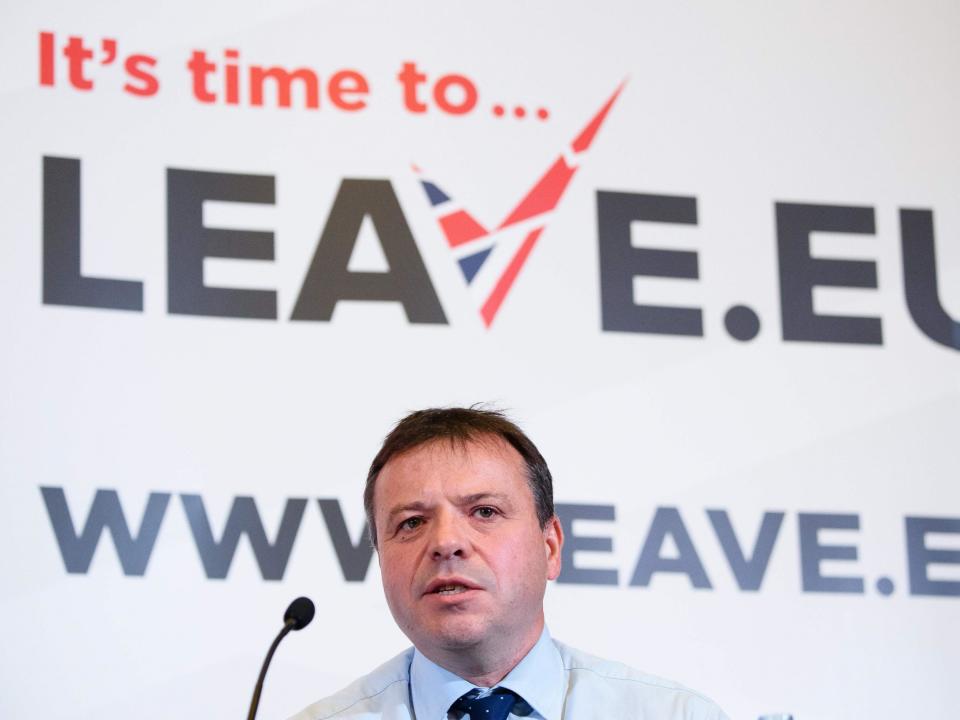Leave.EU’s latest scandal shows digital propaganda is out of control
Elections can be energising, they can be bruising, and over the past few years the public have been to the ballot box far more often than expected.
Two years ago today, Theresa May stood at the lectern outside of No 10 and announced a snap election. It had been less than a year since a divisive referendum, and there wasn’t much appetite from the public or from parliament for yet another campaign.
Today, European elections are looming, a public vote on Brexit seems more and more likely, and another snap election is a constant possibility.
We are in a time of political crisis and no one knows what will happen next, but trust in our elections is essential to rebuilding public faith in politics.
That’s why the government must take urgent action to protect the integrity of our democracy. We do not have the laws we need to defend our democracy from online interference.
Bad actors try to affect the results of our elections by using disinformation, bots, and dark money third-party advertising.
Social media platforms are full of fake news. Clickbait articles cause uproar and are promoted by automated accounts, or bots, that share disinformation and extremist content. Inflammatory posts are shared in closed Facebook groups, where they are spread to huge audiences. And then there’s the advertising. The lack of transparency in digital advertising means that powerful political interests can hide the scale of their influence.
Just recently we saw Facebook adverts pressuring MPs to back a hard Brexit being promoted by a number of campaigns like Britain’s Future. The groups were made to look like a variety of grassroots organisations, but in fact they were all connected to Sir Lynton Crosby’s own company and up to £1m was spent on the targeted adverts.
Digital advertising needs a regulation overhaul. Some of the basic rules that apply to traditional political campaigning, like adding an imprint to a leaflet with the details of who’s promoting it, don’t apply online.
The Electoral Commission has recommended specific changes, including clearly marking who has paid for online adverts and preventing foreign spending on UK elections. Its research shows that the current opacity is a public concern.
All of this is made worse by the fact that our digital market is dominated by a small number of data monopolies that believe they’re above the law.
All too often, tech giants have hosted fake news and dodgy adverts on their platforms and have refused to hand over information to help tackle the problem. These companies make billions from monetising user data, which can then be used to undermine our democracy. Unaccountable platforms are the root cause of the threat to our democracy.
This isn’t all hypothetical. We saw some of these interference tactics deployed by Russian bots in the French and German elections, and there are serious questions about potential wrongdoing in the 2016 EU referendum too.
We have long called for a Mueller-style inquiry into the 2016 referendum and there is much more we need to know about the involvement of Cambridge Analytica. Just this week, we’ve heard allegations that Leave.EU faked a Channel-crossing video that went viral, provoking anti-immigrant sentiment. We need a judicial inquiry into the conduct of Arron Banks and his chums.
But since 2016, as the prime minister would say, nothing has changed.
Some social media platforms have introduced initiatives to help combat these problems, and even Mark Zuckerberg has acknowledged that we need regulation to protect elections, but this government does not seem to understand the urgency. Our laws and regulations are still woefully inadequate.
The government’s online white paper deliberately ducked the difficult questions that affect our elections, and the government hasn’t even responded to the Digital, Culture, Media and Sport Select Committee’s fake news inquiry that found that our election laws are not fit for purpose.
It is the government’s responsibility to defend against election interference and tackle the broken market that lets it flourish. Failure to do so is a dereliction of democratic duty.
The information age has contributed to a crisis in our democracy and the rules by which elections and referendums are fought urgently need modernisation. But the answer to the problems of the information age must be better information, not less.
The solution to a crisis in our democracy must not be that we run scared of voters; right now we need more democracy, not less.
Tom Watson is the deputy leader of the Labour Party and shadow culture secretary. Liam Byrne is Labour MP for Birmingham Hodge Hill

 Yahoo News
Yahoo News 

